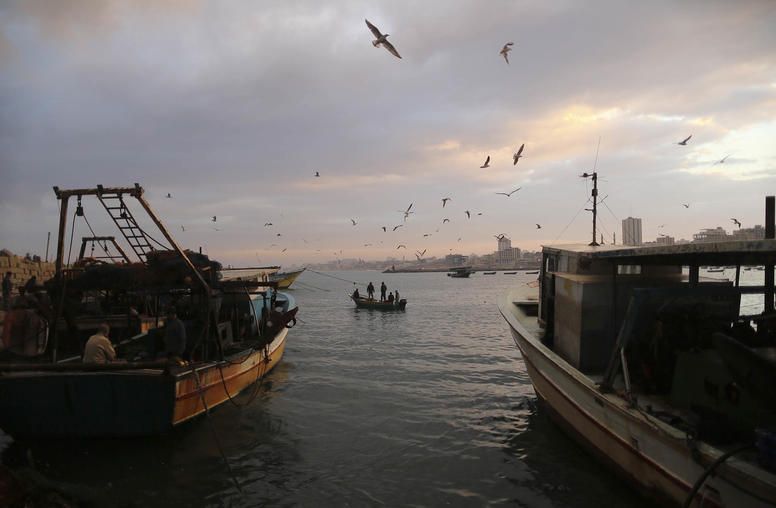Beyond Tahrir: The Trajectory of Egypt's Transition
A senior figure in Egypt’s Supreme Council of the Armed Forces answered questions at USIP on July 25 about the Council’s role in the current transition. Read the full event summary.
July 27, 2011
Egypt’s military is committed to stewarding a transition to democracy and to ceding political power, a senior figure in the country’s Supreme Council of the Armed Forces told an audience at the United States Institute of Peace (USIP) on July 25.
SCAF, as the Supreme Council is known, wants to “expedite” the historic transition in Egypt, said Major General Said Elassar, who serves as assistant to Egypt’s interim leader and defense minister, Field Marshall Mohammed Hussein Tantawi.
“We are not dictators. We are not seeking to proceed in authority,” Elassar said. SCAF took power in the Arab world’s most populous nation after longtime President Hosni Mubarak stepped down on February 11 amid mass popular demonstrations in Cairo’s Tahrir Square and elsewhere. It declared that its turn in power would be temporary — to oversee elections and manage governmental affairs in the interim period.
Elassar used his USIP visit, which preceded meetings with U.S. State Department officials, to give assurances that Egypt’s military leaders are “eager” to return to their traditional roles and have no long-term interest in running the country. “We are not the continuation of the last regime,” he said.
Elassar took pains to align the military establishment with the broad goals of the youth-led winter uprising in the streets. “The people of Egypt own its armed forces,” he said. By late January, he said, “We already recognized it was a revolution of the people of Egypt.” He said that the military had a “pre-determination not to fire” on protesters. He credited a February 1 SCAF communiqué expressing understanding for the popular demands for democracy as “a turning point” in Mubarak’s subsequent departure.
He argued that the SCAF remains popular among Egyptians, despite a recent resumption of demonstrations in Tahrir Square and elsewhere. Protesters are venting frustration at the pace and sequencing of SCAF’s transition plans, as well as the military’s perceived reluctance to hold accountable former Mubarak regime and police officials for violence against protesters during the 18-day uprising in January and February. A new cabinet was sworn in last week with 13 members held over from the Mubarak government. Parliamentary elections initially scheduled for September will be held in October or November, the government announced earlier this month.
Elassar pledged that the military would not participate in the writing of a new Constitution, a task that will fall to the parliament to be created after elections. “We have no business about the contents of the Constitution,” Elassar said. As for the military’s future role, he said, “We are ready to play any role the people ask [of] us.”
Elassar contended that some countries, including the United States, were violating Egyptian laws in their funding of Egyptian nongovernmental organizations. He said that Egyptians were opposed to “foreign interference,” adding, “It is a matter of sovereignty.”
But, some members of USIP's audience expressed skepticism about several of the general's comments. One questioner asked why the SCAF-led government plans to bar foreign election monitors from the parliamentary contest when the U.S. itself allows and facilitates foreign elections observation, arguing that such engagement would benefit Egypt's democracy. Indeed, SCAF'S position has raised concerns about Egypt's prospects to credibly complete a shift to democracy.
Elassar responded that that the SCAF is committed to conducting elections on “a fair basis and transparently” but that outside “monitors” and “observers” would not be permitted. Elassar, however, added that non-Egyptian “visitors” would be welcome to watch the election proceedings.
His remarks also indicated an ongoing softening of official attitudes toward the Muslim Brotherhood, a once banned fundamentalist political movement that is undergoing significant internal divisions as more moderate factions come to the fore. On both the Muslim Brotherhood and politically active Salafists, Elassar said, “If they are committed to the law, to the Constitution of Egypt, they have the right to participate in political life.” He added, “Day by day, the Muslim Brothers are changing, getting to a more moderate track.”
On Egypt’s foreign relations, Elassar acknowledged “ups and downs” with the United States but thanked it for decades of economic and political support. He called military-to-military ties “excellent” and said that Egypt wanted to “enhance and spread” a “strategic relationship” with Washington. He also reiterated promises that Egypt would not break past, signed agreements, including its 1979 peace treaty with Israel.
Explore Further
- Eye on the Middle East and North Africa - Experts from the U.S. Institute of Peace (USIP) are closely following developments throughout the Middle East and North Africa. In a series of reports and interviews, they cover a wide range of issues.



